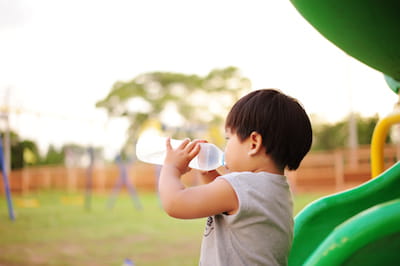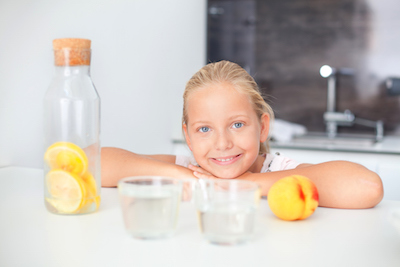How to recognize and prevent dehydration in kids
Before you know it the school year will be over and summer break will be upon us. As our kids buzz with excitement at the thought of their summer adventures, and we parents get a little stressed wondering how to keep kids busy for the next few months, there’s something else to consider. As the weather heats up each day, it becomes more and more critical to be sure your kids aren’t getting dehydrated in the summer heat.
Whether it’s a day at the beach, playing hide-and-seek with friends in the front yard, having a pool party or playing organized sports, it’s important to make sure your kids are getting enough fluids to keep them happy and healthy.
Some signs your kid may be dehydrated
A child suffering from mild to moderate dehydration may:
- Play less than usual
- Urinate less frequently
- Have a parched, dry mouth
- Have fewer tears when crying
- Infants or toddlers may have a sunken soft spot on top of their head
- Decreased bowel movements (if dehydration is not due to diarrhea)

Young athletes may already be dehydrated by the time they start to feel thirsty, so it’s best to prevent dehydration before it occurs.
How to prevent dehydration
Active kids should drink between six and eight glasses of water each day.
If plain water isn’t available, you may give sports drinks, but remember that these can contain excess sugar and calories. While many parents think their children need the electrolytes offered by sports drinks to aid in hydration, experts agree that water really is best.
Fruits and vegetables also are a good source of water, so you might consider packing a watermelon for a treat at the beach or offering a juicy apple for snack time.
What to do if symptoms are severe
If your child has any of the following symptoms, you should seek the help of a pediatrician immediately:
- Very fussy or upset
- Excessively sleepy
- Sunken eyes
- Cool, discolored hands or feet
- Urinates only once or twice a day
 It’s also important to note that while exertion in the summer heat can lead to dehydration, there are other (probably more frequent) causes of dehydration, too- fever, vomiting and diarrhea. In the case of illnesses such as these, it’s important to increase water intake to compensate for the fluid losses. If your child has had significant fluid loss due to diarrhea or vomiting, contact your pediatrician for guidance on making sure your child stays well-hydrated.
It’s also important to note that while exertion in the summer heat can lead to dehydration, there are other (probably more frequent) causes of dehydration, too- fever, vomiting and diarrhea. In the case of illnesses such as these, it’s important to increase water intake to compensate for the fluid losses. If your child has had significant fluid loss due to diarrhea or vomiting, contact your pediatrician for guidance on making sure your child stays well-hydrated.







